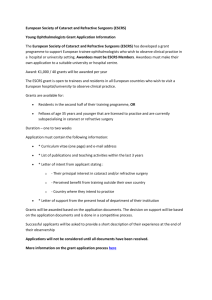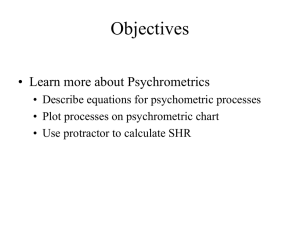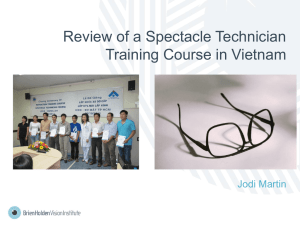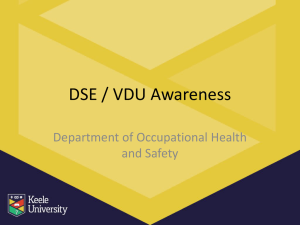IC-74_GoesSr_Handout1
advertisement
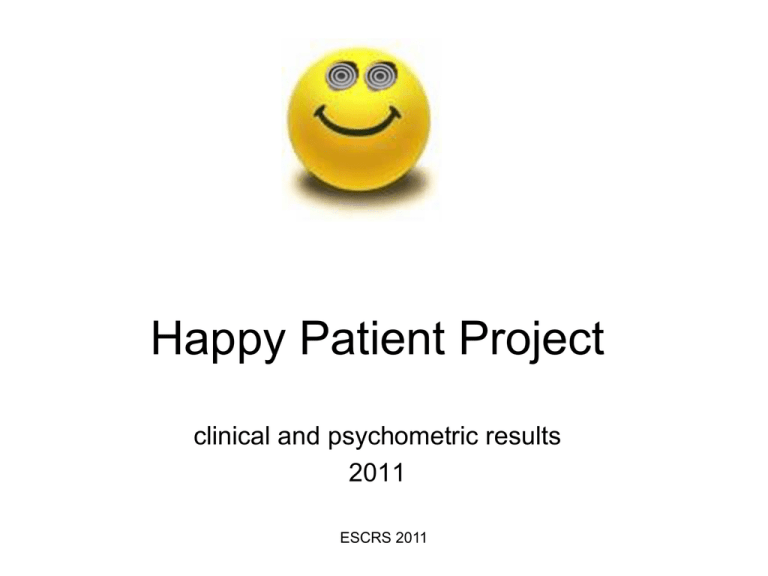
Happy Patient Project clinical and psychometric results 2011 ESCRS 2011 Impact of personality characteristics on satisfaction after multifocal IOL-implantation – the “Happy Patient Study” Ulrich Mester, MD, Frank Goes MD, Werner Huetz MD, Thomas Neuhann MD, Stefanie Schmickler MD, Peter Szurman MD, Thomas Vaterrodt, MD Corresponding author: Ulrich Mester, MD, Augenzentrum im Medizeum, Europaallee 15, 66113 Saarbruecken, Germany, email: prof.mester@email.de Financial Disclosure: No author has a financial or proprietary interest in any material or method mentioned. Introduction: • At the present the implantation of bi- or multifocal intraocular lenses (MIOL) is the best established method to gain spectacle independence after cataract surgery. • Many investigations reveal a percentage of more than 80% of patients being satisfied after MIO-implantation without need for any glasses (1,2,3,5,6,7). • Patient’s satisfaction depends on a myriad of factors as optic design of the MIOL, near addition, light transmittance, characteristics, pupil diameter, and the visual needs of each individual patient for far, intermediate, and near distances. • Clinical studies with MIOL`s of different optic designs (refractive, diffractive, hybrid) showed comparable results with small percentage of unsatisfied patients. (Authors). • Dissatisfaction in these patients is often not correlated to the objective visual outcome. • Why do some patients report not to profit from multifocal lenses and/or to suffer seriously from side effects as halos and glare without objective findings which could explain these subjective intolerance? • The postoperative exploration of these patients let to the consideration that there may be individual personality characteristics which make the difference between objective findings and subjective feelings. • We therefore performed a prospective multicentre study to investigate possible personality factors which would enable us to select the good candidates to become “Happy Patients”. Patients and methods: Study Group and Protocol • In a prospective study, patients with bilateral MIOL-implantation were enrolled in 8 European ophthalmological centres. According to statistical needs a minimal number of 150 patients had to be included without restriction for recruitment in each centre. Inclusion criteria were bilateral implantation of MIOL in eyes without pathological findings except cataract, not more than 1.5 D astigmatism, informed consent of the study protocol, and patients being able and willing to answer the study questions preoperatively and at two control visits, three and six months after surgery of the second eye. Another major inclusion criterion was patient’s motivation for spectacle independence. • Ophthalmological data and questionnaires where send to and evaluated by an independent reading centre (T.V.). Intraocular Lenses • Each centre was free to choose the MIOL´s of it`s own preference. The following lenses where implanted: Tecnis ZM900 (29%), Tecnis ZMA00 (26%) (AMO), ReSTOR+4 (21%), ReSTOR+3 (10%) (Alcon), AcriLisa (4%) (Zeiss). ESCRS 2011 Table 2: Distribution of the different MIOL models on right and left eyes OS OD Tecnis ZM900 ReZoom Tecnis ZMA00 Tecnis ZM900 23 18 10 ReZoom 13 1 2 Tecnis ZMA00 12 ReSTOR+4 2 ReSTOR+4 AcriLisa ReSTOR+3 2 35 37 AcriLisa 8 ReSTOR+3 20 ESCRS 2011 Table 3: Visual performance of activities in different distances 3 months after surgery. n=163 easy Near (e.g.reading) Intermediate (e.g.computer work) Far (e.g.TV) 85% 62% 85% difficult 9% 26% 12% Not able without glasses 6% 12% 3% ESCRS 2011 • The general satisfaction after MIOL implantation was high: 82.2% would decide again for this procedure, only 3.7% would not, 14.1% were uncertain at the 3-months control. These results were nearly unchanged after 6-months (82.5%, 2.8%, and 14.8%). • A more detailed presentation of the degree of satisfaction is shown in figure 3. Obviously, the percentage of patients being satisfied or completely satisfied increases from 3 to 6-months after surgery wereas the group of only moderately satisfied patients decreases. The small unsatisfied group of patients remains constant. There was no significantly difference between females and males. • Out of 23 patients being unsatisfied or only moderately satisfied 11 patients were completely spectacle independent. One patient was unsatisfied and 10 patients were moderately unsatisfied with their visual performance. One patient reported on severe, five of strong, and five of moderate glare. The impact of halos was described as severe by two, as strong by three, and as moderate by six patients. Reduced vision under mesopic conditions was severe in one patient, strong in one patient and moderate in four patients. ESCRS 2011 Table 4: Pronounced personality characteristics evaluated by the psychometric tests N=183 % No personality disorder 9 self-discipline 5 orderliness 29 deliberation 29 achievement striving 38 competence 44 dutifulness . 51 compulsive checking 60 ESCRS 2011 Table 5: Correlation of postoperative satisfaction with data other than psychometric (no difference at the two observation periods). Correlation with postoperative satisfaction Significance Gender n.s Preoperative expectations and accepted limitations n.s Less postoperative cylinder <0.05 Spectacle independence distance <0.01 Spectacle independence near <0.05 God vision in different distances and different lighting conditions < 0.01 Less bothering by side effects as photic phenomena Glare Halos < 0.01 Less blurred vision Near Distance < 0.01 Less problems under mesopic conditions < 0.01 More activities without spectacles < 0.05 < 0.01 ESCRS 2011 < 0.01 Table 6: Correlation of psychometric characteristics with postoperative side effects, visual function, and satisfaction. Correlation with psychometric data Significance Compulsive checking Glare Halos Stereo vision Distance vision < 0.05 < 0.01 < 0.01 < 0.05 Orderliness Glare Halos Stereo vision Mesopic vision < 0.01 < 0.05 < 0.05 < 0.05 Competence Glare Halos Postoperative satisfaction < 0.05 < 0.05 < 0.01 Dutifulness Halos Stereo vision < 0.05 < 0.05 achievement striving deliberation self-discipline n.s ESCRS 2011 Conclusion: • Individual personality disorders does significantly influence the tolerance of side effects and patients satisfaction after MIOL implantation. Therefore a preoperative evaluation of psychometric data may help to get more ´Happy patients`. • The results of these study can be used to concentrate such a manual on the most relevant questions. ESCRS 2011 The “New Happy Patient” questionaire female male Age Strongly disagree I’m known for my prudence and common sense I would rather keep my options than plan everything in advance I try to perform all the tasks assigned to me conscientiously I don’t take civic duties like voting seriously I keep my belongings neat and clean Sometimes I’m not dependable or reliable as I should be I keep myself up-to-date and usually make clever decisions I am not a very methodical person I pay my debts promptly and in full I often come into situations without being fully prepared I like to keep everything in its place so I know just where it is Sometimes I cheat when I am playing card games on my own I pride myself on my sound judgement I never seem to be able to get organized When I make a commitment, I can always be counted on to follow through Before I know what I want I need to think it through I check things several times to be on the safe side I repeat activities frequently until I am happy with it Some thoughts don’t get out of my mind I always need to check once more if I have closed the door properly ESCRS 2011 Disagree Neutral Agree Strongly agree The “New Happy Patient” questionaire Strongly disagree I’m known for my prudence and common sense I would rather keep my options than plan everything in advance I try to perform all the tasks assigned to me conscientiously I don’t take civic duties like voting seriously I keep my belongings neat and clean Sometimes I’m not dependable or reliable as I should be I keep myself up-to-date and usually make clever decisions I am not a very methodical person I pay my debts promptly and in full I often come into situations without being fully prepared I like to keep everything in its place so I know just where it is Sometimes I cheat when I am playing card games on my own I pride myself on my sound judgement I never seem to be able to get organized When I make a commitment, I can always be counted on to follow through Before I know what I want I need to think it through I check things several times to be on the safe side I repeat activities frequently until I am happy with it Some thoughts don’t get out of my mind I always need to check once more if I have closed the door properly ESCRS 2011 Disagree Neutral Agree Strongly agree Thank you for your attention ESCRS 2011
